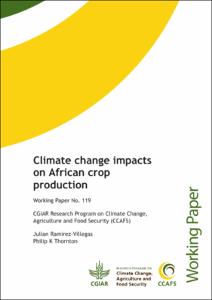Climate change impacts on African crop production
 According to the most recent IPCC report, changes in climates over the last 30 years have already reduced global agricultural production in the range 1-5 % per decade globally, with particularly negative effects for tropical cereal crops such as maize and rice. In addition, there is now mounting evidence suggesting that even at low (+2 ºC) levels of warming, agricultural productivity is likely to decline across the globe, but particularly across tropical areas. This working paper provides an overview of projected climate change impacts on crop production and suitability across Africa, using a combination of literature review, models and new data analysis. The paper focuses on the biophysical impacts of nine agronomic crops critical for food security: maize, common bean, cassava, sorghum, yam, finger millet, pearl millet, groundnut, and banana, as well as on one cash crop: coffee, and provides insights as to the countries and crops in Africa that are projected to be most negatively impacted. The working paper also reviews some potential avenues for adaptation. All analyses focus on rainfed agriculture.
According to the most recent IPCC report, changes in climates over the last 30 years have already reduced global agricultural production in the range 1-5 % per decade globally, with particularly negative effects for tropical cereal crops such as maize and rice. In addition, there is now mounting evidence suggesting that even at low (+2 ºC) levels of warming, agricultural productivity is likely to decline across the globe, but particularly across tropical areas. This working paper provides an overview of projected climate change impacts on crop production and suitability across Africa, using a combination of literature review, models and new data analysis. The paper focuses on the biophysical impacts of nine agronomic crops critical for food security: maize, common bean, cassava, sorghum, yam, finger millet, pearl millet, groundnut, and banana, as well as on one cash crop: coffee, and provides insights as to the countries and crops in Africa that are projected to be most negatively impacted. The working paper also reviews some potential avenues for adaptation. All analyses focus on rainfed agriculture.
Related Content
- Groundswell Africa: a deep dive into internal climate migration in Senegal
- Groundswell Africa: a deep dive into internal climate migration in Nigeria
- Groundswell Africa: internal climate migration in West African countries
- A blueprint for strengthening food system resilience in West Africa: regional priority intervention areas
- African Transformation Report 2017: agriculture- powering Africa’s economic transformation
- Study reveals the gender gap in Tanzania, Uganda climate policies
